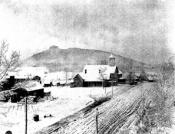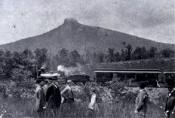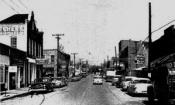History

The region’s earliest known inhabitants were the Saura, or Cheraw, people. In the late 17th century the Saura people left their homes, near present day Asheville, and settled in the region near the Dan River and Sauratown Mountains. Pilot Mountain, which lends its name to the town, is a remnant of the Sauratown Mountains. The Saura people knew the mountain as Jomeokee meaning Great Guide or Pilot. In 1710, the Saura abandoned their villages in the Pilot Mountain region.
Although the Saura people abandoned their villages, the mark ancient Native American tribes left on the region remained. The paths used by ancient Native American tribes became the Great Wagon Road, used by 18th century colonist to travel and settle further South. On the Great Wagon Road, Jomeokee or Pilot served as a landmark for German Moravian settlers traveling to their new home of der Wachua, or Wachovia, present day Winston-Salem. Wachovia quickly became an established urban center and led to further settlement of the Piedmont region including the Town of Pilot Mountain.

German settlement of the region continued, along with settlement of the Scots-Irish, and English Quakers, who relocated due to the scarcity and expense of fertile land in the northeast. With these settlers came a lasting cultural impression on the Town of Pilot Mountain. Unlike the settlement of Eastern North Carolina, with large plantations, widespread use of slave labor, and the establishment of the Church of England, the Piedmont region, including Pilot Mountain, was inhabited mainly by subsistence farmers, with smaller farms, with few or no slaves. The fertile land provided excellent sites for mills, farms, and especially the growth of tobacco. The region also offered a variety of religious denominations not seen in the eastern parts of North Carolina, including: Quaker, Lutheran, German Reformed, Moravian, Dunkard, Baptist, Presbyterian and Methodist. This variety of religious organizations is still evident in Pilot Mountain.

As settlement continued, towns grew and trade routes developed from the small farms in Pilot Mountain to export centers. The fast moving, deep rivers east of the Piedmont region did not allow for easy access to the ports of coastal North Carolina, so trade routes from the Piedmont went to Virginia. As time passed, this was remedied and the Cape Fear and Yadkin Valley railroad was constructed from the Atlantic port of Wilmington to Mount Airy, passing through Pilot Mountain. With the completion of the railroad in 1888, the depot became a center of commercial and social activity. The railroad gave rise to the growth of Pilot Mountain, and created the need for an organized local government. March 9, 1889, the Act of Incorporation for the Town of Pilot Mountain was adopted.
The Act of Incorporation did not immediately create major changes to the rural, small town way of life of Pilot Mountain. Those in town provided goods to meet the needs of an agricultural community: livery stables, harness makers, clothiers, general merchants, blacksmiths, tobacco factories, doctors, and of course churches. The most dramatic shift in the community arose from the railroad’s passage to Mount Airy. Hotels and boarding houses appeared to accommodate travelers from the East that were trying to reach cooler regions of the state, traveling salesmen, and people seeking the advertised healing powers of six regional mineral springs resorts.

It wasn’t until the 20th century that Pilot Mountain underwent dramatic changes. In 1910, Pilot Mountain acquired its first public school. In 1914, the Bank of Pilot Mountain was constructed. Pilot Mountain had its first power plant provide services in 1916. The 1930’s ushered in access to the town’s first public library and movie theater. During the 1940’s, Pilot Mountain witnessed a dramatic boost to its economy when textile manufactures arrived. The textile industry remained a strong economic driving force until the 1990’s. With the loss of large manufacturers the town has undergone a shift to blend old and new by focusing on small locally owned businesses, viticulture, and innovative agriculture. Now, as in years past, Pilot Mountain remains an ideal setting, offering open spaces where businesses, ideas, and families can grow.
